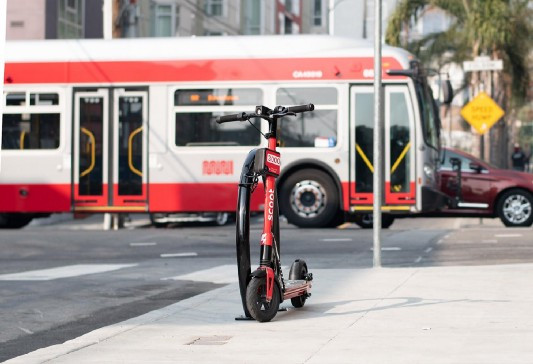
The electric scooter wars of 2018
This was was assuredly the year of the electric scooter. Between massive fundraising rounds, majestic valuations and both Uber and Lyft’s entrance into the space, it’s clear these scooters are here for the long haul.
But merely because investors have spewed millions of dollars into these companies in the past year, the electrical scooter business is not without its rigors. In point, it’s an immensely difficult business with tough force fiscals, regulatory challenges on a city-by-city basis, and a farcical number of opponents striving for the micro-mobility business market share.
It’s only a matter of time before consolidation grows the only path to survive and, once, we’ve started to see some early signalings of that with Uber’s partnership with Lime, as well as Ford’s acquisition of Spin. Let’s take a look at how service industries got to where it is today.
Bird, currently appraised northward of$ 2 billion, was the first electrical scooter corporation to launch, having first are used in September 2017 in Santa Monica, Calif. One year later, Bird announced it thumped 10 million moves across its 100 -plus municipals and over 2 million equestrians at the time.
Then came Spin, which started as a bike-share startup. In February, Spin announced its plans to get into electric scooter sharing before eventually deciding in June that it was going all in on scooters. Fast forward to November, and Ford decided to gobble up Spin in a consider worth close to $ 100 million.
Next up was Lime, which too got its beginnings as a bike-share fellowship. Also in February, Lime unveiled its take on electrical scooters. Since then, Lime has distributed its scooters in over 100 municipalities in the U.S. and 27 international municipalities. Lime has also partnered with Uber to offer Lime scooters within the Uber app.
Skip, founded by Boosted Board co-founder Sanjay Dastoor, was a bit of a latecomer — albeit one that has an approaching that municipals seem to appreciate. Skip launched in March, and has since deployed scooters in Washington , D.C ., Portland, Ore ., and San Francisco — where it earned one of the two begrudged permits to operate in the heart of Silicon Valley. The other scooter startup permit in San Francisco went to Scoot, a company that too operates shared mopes in the city, as well as in Barcelona.
On an international-only elevation, there are corporations like Y Combinator-backed Grin, which raised a $45.7 million Series A round in October to control shared, electric scooters in Latin american states. Later that month, the company partnered with Sao Paulo-based Ride to further the company’s swelling across Latin America, which is becoming a hot spot for scooters. In September, Yellow grew a $63 million Series A round for its bike- and scooter-share companionship. Meanwhile, Bird and Lime are actively targeting groceries in the area.
Abroad, scooters have also popped up in Tel Aviv, London, Paris and 15 other municipalities across countries like Spain, Switzerland, Portgual and others.
The regulatory crackdown
Bird, Lime and Spin abruptly became known for their strategies of begging for forgiveness rather than first asking for dispensation. Regulatory challenges for these electric scooter corporations bristled in Santa Monica, San Francisco, Austin and other metropolis around the country.
In San Francisco, the Municipal Transportation Agency imparted a several-months-long process to regulate which scooters would be allowed to operate in the city. The city’s admit process came as a result of Bird, Lime and Spindeploying their electric scooters without dispensation in the city in March. As part of a new metropolitan rule, which went into outcome June 4, scooter firms were not able to operate their services in San Francisco without work permits. Today, just Skip and Scoot are permitted to operate in the city.
Santa Monica, Austin and many other cities have also had their fair share of regulatory hurdles. Still, Lime has more than double-faced the number of metropolitans where it is operating the U.S. since June. Meanwhile, the number of municipals where scooters in the U.S. has quickly increased from merely 33 in August to more than 90 at the time of book.
Building durable scooters is hard
Initially, many companies were not concentrate on building their own scooters. Instead, they slapped stickers and insigniums on scooters that have been around for years. Lime, Bird and Spin propelled utilizing scooters from Ninebot, a Chinese scooter corporation that has merged with Segway. Ninebot is in favour of investors, including Sequoia Capital, Xiaomi and ShunWei.
That started to change with the acces of Skip, which fixed its debut with heavy-duty scooters in March. Skip has since begun rolling out new versions of its scooters, with are projected to eventually construct absolutely patronage scooters from the ground up.
Earlier this month, Skip launched brand-new scooters with cameras and locks. The point is to improve its gang economics, which are notoriously difficult in this cavity. Investors, who have spewed tens of thousands of dollars into electric scooter startups like Bird and Lime, are now pumping the shatters on fund due to the difficulty of the business. Some scooters reportedly only last about two months, which is not enough time to recoup the cost of purchasing the scooter. Perhaps that’s why Skip reportedly received $100 million in debt earlier this month. Skip, nonetheless, declined to comment on the lifespan of its scooters and its pay financing.
In May, Lime partnered with Segway to propel its next generation of electric scooters. These Segway-powered Lime scooters are designed to be safer, longer-lasting via battery power and more sturdy for what the sharing economy expects, Lime CEO Toby Sun told TechCrunch earlier this year.
But this partnership hasn’t been without its topics. In October, Lime recalled some of its scooters due to battery fire pertains. The next month, Lime gave$ 3 million toward a new safety initiative called “Respect the Ride.” Safety, in general, is a major concern. In September, someone lost their life after a scooter coincidence.

A Scoot scooter with the company’s brand-new fastens in San Francisco. Photo via Scoot.
Scoot, which works with Telepod to originate its scooters, has also had its publishes. In November, Scoot CEO revealed that during the course of its first two weeks of Scoot’s business of shared, electric scooters in San Francisco, more than 200 scooters were either stolen or injury beyond restore . That’s why this month, Scoot unveiled a new locking machine in an attempt to prevent theft.
Superpedestrian, recognizing that this is a hard business, is putting its fund on a business-to-business scooter play. Superpedestrian’s prime render is a sturdier scooter with self-diagnostic and remote administration abilities. Superpedestrian says its scooters can maintain themselves from nine to 18 months at a time, while other scooters break down more often, the company says.
Superpedestrian’s scooters are equipped to self-diagnose issues that involve factors, the motherboard, engine controller, land management organization, batteries and more. In total, Superpedestrian can spot about 100 different things that could be wrong with it. Superpedestrian says it once has a big player on board, though the CEO would not disclose which one. The first deployment, nonetheless, will happen in Q1 2019.
Consolidation is coming
There is simply be so many electrical scooters on any dedicated metropolitan street, which is a result of increasing metropoli regulations around these micro-mobility assistances. And even if metropolitans didn’t have restriction on the increasing numbers of scooter operators, there are not enough major differentiators between these services to obtain substantial the shares. Meanwhile, investors have mostly sat their pots on the likes of Bird and Lime, and with Lyft and Uber now making their scooter dallies, it’s going to be really hard for other, smaller companies to compete.
As mentioned earlier, Ford bought electrical scooter corporation Spin, Uber has a partnership with Lime, and Uber is also reportedly looking to buy either Lime or Bird. Bird has, nonetheless, said it’s not up for sale, which leaves Lime. And if Lime sells to Uber, perhaps Lyft will go after Scoot or Skip.
I patently cannot tell the future, but do expect to see amalgamation, added market launchings, and scooter companies looking to improve their unit economics by relying more on custom-built scooters rather than off-the-shelf ones from the likes of Segway and Xiaomi.
Read more: feedproxy.google.com

